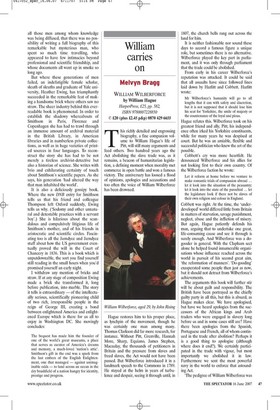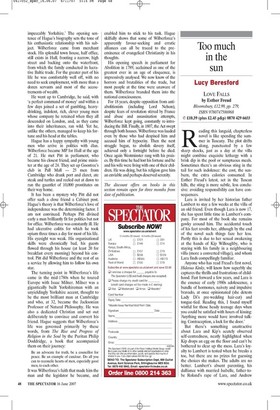William carries on
Melvyn Bragg WILLIAM WILBERFORCE by William Hague HaiperPress, £25, pp. 582, ISBN 9780007228850 © £20 (plus £2.45 p&p) 0870 429 6655 This richly detailed and engrossing biography, a fine companion volume to William Hague's life of Pitt, will still many arguments and feed others. Two hundred years ago the Act abolishing the slave trade was, as it remains, a beacon of humanitarian legislation, a defining moment when morality met commerce in open battle and won a famous victory. The anniversary has loosed a flood of opinions, apologies and accusations and too often the voice of William Wilberforce has been drowned.
Hague restores him to his proper place, as lynchpin of the movement, though he was certainly one man among many. Thomas Clarkson did far more research, for instance. Without Pitt, Grenville, Hannah More, Sharp, Equiano, James Stephen, Macaulay, the thousands of petitioners in Britain and the pressure from slaves and freed slaves, the Act would not have been passed. But Wilberforce introduced it in a landmark speech to the Commons in 1789. He stayed at the helm in years of turbulence and despair, seeing it through until, in 1807, the church bells rang out across the land for him It is neither fashionable nor sound these days to accord a famous figure a unique role, but sometimes there is no alternative. Wilberforce played the key part in parliament, and it was only through parliament that the trade could be abolished.
From early in his career Wilberforce's reputation was attacked. It could be said that all assaults have since followed lines laid down by Hazlitt and Cobbett. Hazlitt wrote: Mr Wilberforce's humanity will go to all lengths that it can with safety and discretion, but it is not supposed that it should lose him his seat for Yorkshire, the smile of majesty or the countenance of the loyal and pious.
Hague refutes this. Wilberforce took on his greatest friend and ally, Pitt; his independence often irked his Yorkshire constituents, while for many years he was despised at court. But he was an amiable, flexible and successful politician who knew the art of the possible.
Cobbett's cry was more heartfelt. He denounced Wilberforce and his allies for not looking first to their own country. Of the Wilberforce faction he wrote: Let it reform at home before we venture to make romantic trials of compassion abroad ... let it look into the situation of the peasantry; let it look into the state of the parochial ... let the legislature look if there not be slaves of their own religion and colour in England.
Cobbett was right. At the time, the 'underdeveloped' world differed little from Britain in matters of starvation, savage punishment, neglect, abuse and the infliction of misery. But again, Hague patiently defends his man, arguing that to undertake one great, life-consuming cause and see it through is surely enough. And Wilberforce was a dogooder in general. With the Clapham sect alone he helped found innumerable organisations whose influence reached across the world in pursuit of his second great aim, `the reformation of manners'. Do-gooding' exasperated some people then just as now, but it should not detract from Wilberforce's achievements.
The arguments this book will further stir will be about guilt and responsibility. The British have been portrayed as the chiefly guilty party in all this, but this is absurd, as Hague makes clear. We have apologised, but have we heard apologies from the successors of the African kings and Arab traders who were engaged in slavery long before us and in some cases still are? Have there been apologies from the Spanish, Portuguese and French, all of whom continued in the trade after abolition? Perhaps it is a good thing to apologise (although where does it end?). We certainly participated in the trade with vigour, but most importantly we abolished it in law. Furthermore we sent the most powerful navy in the world to enforce that astounding Act.
'The pedigree of William Wilberforce was impeccably Yorkshire.' The opening sentence of Hague's biography sets the tone of his enthusiastic relationship with his subject. Wilberforce came from merchant stock. His splendid town house, half office, still exists in Hull, fronting a narrow, high street and backing onto the waterfront, from which the family conducted its lucrative Baltic trade. For the greater part of his life he was comfortably well off, with no need to seek employment, with more than a dozen servants and most of the accoutrements of wealth.
He went up to Cambridge, he said, with 'a perfect command of money' and within a few days joined a set of gambling, heavydrinking, indolent, rich, clever young men whose company he retained when they all descended on London, and, as they came into their inheritances, ran wild. Yet he, unlike the others, managed to keep his fortune and his head at the tables.
Hague has a happy sympathy with young men who arrive in politics with élan. Wilberforce became MP for Hull at the age of 21. He met Pitt in parliament, who became his closest friend, and prime minister at the age of 24. They set up Goostree's club in Pall Mall — 25 men from Cambridge who drank port and claret, ate steak and turtles and reeled out at dawn to run the gauntlet of 10,000 prostitutes on their way home.
It has been a mystery why Pitt did not offer such a close friend a Cabinet post. Hague's theory is that Wilberforce's love of independence was the determining factor. I am not convinced. Perhaps Pitt divined early a man brilliantly fit for politics but not for office. Wilberforce was constantly ill. He had ulcerative colitis for which he took opium three times a day for most of his life. His eyesight was weak. His organisational skills were chronically bad, his guests flowed through his house (at least 20 for breakfast every morning) beyond his control. Pitt did Wilberforce and the rest of us a service by allowing him to follow his own star.
The turning point in Wilberforce's life came in the mid-1780s when he toured Europe with Isaac Milner. Milner was a gigantically built Yorkshireman with an unyieldingly Yorkshire accent, thought to be the most brilliant man at Cambridge and who, at 32, became the Jacksonian Professor of Natural Philosophy. He was also a dedicated Christian and set out deliberately to convince and convert his friend. Hague suggests that Wilberforce's life was governed primarily by these words, from The Rise and Progress of Religion in the Soul by the Puritan Philip Doddridge, a book that accompanied them on their journey: Be an advocate for truth, be a councillor for peace. Be an example of candour. Do all you can to reconcile hearts of men, especially good men, to each other.
It was Wilberforce's faith that made him the man and the legislator he became, and enabled him to stick to his task. Hague skilfully shows that some of Wilberforce's apparently favour-seeking and erratic alliances can all be traced to the preeminence of evangelical Christianity in his thoughts.
His opening speech in parliament for Abolition in 1789, acclaimed as one of the greatest ever in an age of eloquence, is impressively analysed. We now know of the horrors and brutalities of the trade, but most people at the time were unaware of them. Wilberforce branded them into the national consciousness.
For 18 years, despite opposition from antiabolitionists (including Lord Nelson), despite fears of revolution stirred by France and abuse and assassination attempts, Wilberforce kept going, constantly re-introducing the Bill. Finally, in 1807, the Act swept through both houses. Wilberforce was lauded even by those who had despised him and accused him of hypocrisy. Then the next struggle began, to abolish slavery itself achieved only a fortnight before he died. Once again Westminster rang with his praises. By this time he had lost his fortune and he and his wife were living with one of their children. He was dying, but his religion gave him an enviable and perhaps deserved serenity.
The discount offers on books in this section remain open for three months from date of publication.





















































 Previous page
Previous page